PHOTO: Blogger Olimjon Khaidarov sentenced to eight years in prison (Kun.uz)
1/ KEY FINDINGS
In Uzbekistan, 142 attacks/threats against professional and civilian media workers, and editorial offices of traditional and online publications, were identified and analysed in the course of the research for 2023. Data for the study were collected using open-source content analysis in Uzbek, Russian and English. The report also uses data obtained by experts from the Justice for Journalists Foundation. A list of the main sources is provided in Annex 1.
- Attacks via judicial and/or economic means remained the main method of exerting pressure on media workers in Uzbekistan.
- Two media workers were recognised as political prisoners in Uzbekistan: Shokhida Salomova, author and administrator of the telegram channel Pathanatomy of the Country of Uz and the YouTube channel Shakhina Salomova, and Dauletmurat Tazhimuratov, the former editor-in-chief of the newspaper El Khyzmetinde (In the Service of the People).
- There were 7 recorded physical attacks against media workers in 2023, compared to 10 in 2022.
- The number of non-physical attacks decreased slightly, with 11 incidents recorded in 2023 compared to 13 in 2022.
- In 92% of cases, these attacks were committed by government officials. The main targets of these attacks were journalists/bloggers who criticised the state or commercial entities.
2/ THE POLITICAL SITUATION AND THE MEDIA IN UZBEKISTAN
In the annual Reporters without Borders press freedom ranking for 2023, Uzbekistan ranked 137 out of 180 countries. In 2022, the country ranked 133rd. According to Reporters Without Borders, authorities exert significant control over the media, and state propaganda continues to dominate the country. The government controls bloggers and online activists, often suppressing any public expression of dissent.
In Freedom House’s Freedom on the Net report for 2023, Uzbekistan scored 25 out of 100 points, and is classified as ‘not free’ in terms of people’s access to the internet.
The Constitution of Uzbekistan protects freedom of speech and media rights, and prohibits censorship. Article 29 of the Constitution guarantees the right to collect and disseminate information. However, the country’s laws do not include penalties for interfering with the activities of media outlets and journalists. In March, journalists and activists appealed to the President of Uzbekistan via a statement about “strict, hidden censorship”. More than 40 signatories asked the president to “provide historic assistance in ensuring true freedom of the press,” and stated: “We journalists and members of the public are concerned about strict, hidden censorship. Editorial offices, journalists, bloggers, or individuals expressing any opinion continue to face serious obstacles, pressure, and intimidation.”
The main political event of 2023 was the renewal of the Constitution of the Republic of Uzbekistan. The updated version of the Constitution was approved in a referendum on 30 April 2023, with a turnout of 84.5%. The amended Constitution enshrines the status of Uzbekistan as a social and secular state. One of the key innovations in the legislation is the adoption of a provision stating that “the state creates conditions to ensure access to the internet”.
On 9 July, early presidential elections were held in the country, in which incumbent President Shavkat Mirziyoyev was re-elected, winning 87% of the vote.
In August 2023, the president’s daughter, Saida Mirziyoyeva, became an “assistant to the head of state”. She previously worked as head of the communications and information policy sector (part of the presidential administration). Officials previously served on the board of trustees of the Foundation for the Support and Development of National Mass Media. Their influence on the media and involvement in the development of the new Information Code, with the assistance of UNESCO, remains high.
On 12 September 2023, President Mirziyoyev approved the “Uzbekistan – 2030” strategy, which will strengthen guarantees for citizens’ rights to freely seek, receive, and disseminate information. The concept of “blogger” was established in the law “On Informatisation”. Based on the definition provided in Article 3 of this law, a blogger is “an individual who posts publicly-accessible information of various types, including social, political, economic, and other content, on their website and/or webpage on the internet, for the purpose of user discussion”. It is understood that almost all internet users in Uzbekistan who have their own accounts on social media are thus considered bloggers, regardless of their activity and number of subscribers.
3/ GENERAL ANALYSIS OF ATTACKS
Figure 1 provides a general analysis of the three main types of attacks/threats against media workers in Uzbekistan. Compared to 2017, the number of recorded incidents has more than tripled. As in previous years, attacks via judicial and/or economic means remained the most common method of pressure, accounting for 89% of the total number of incidents. Compared to 2022, the number of both physical and non-physical attacks has decreased slightly.
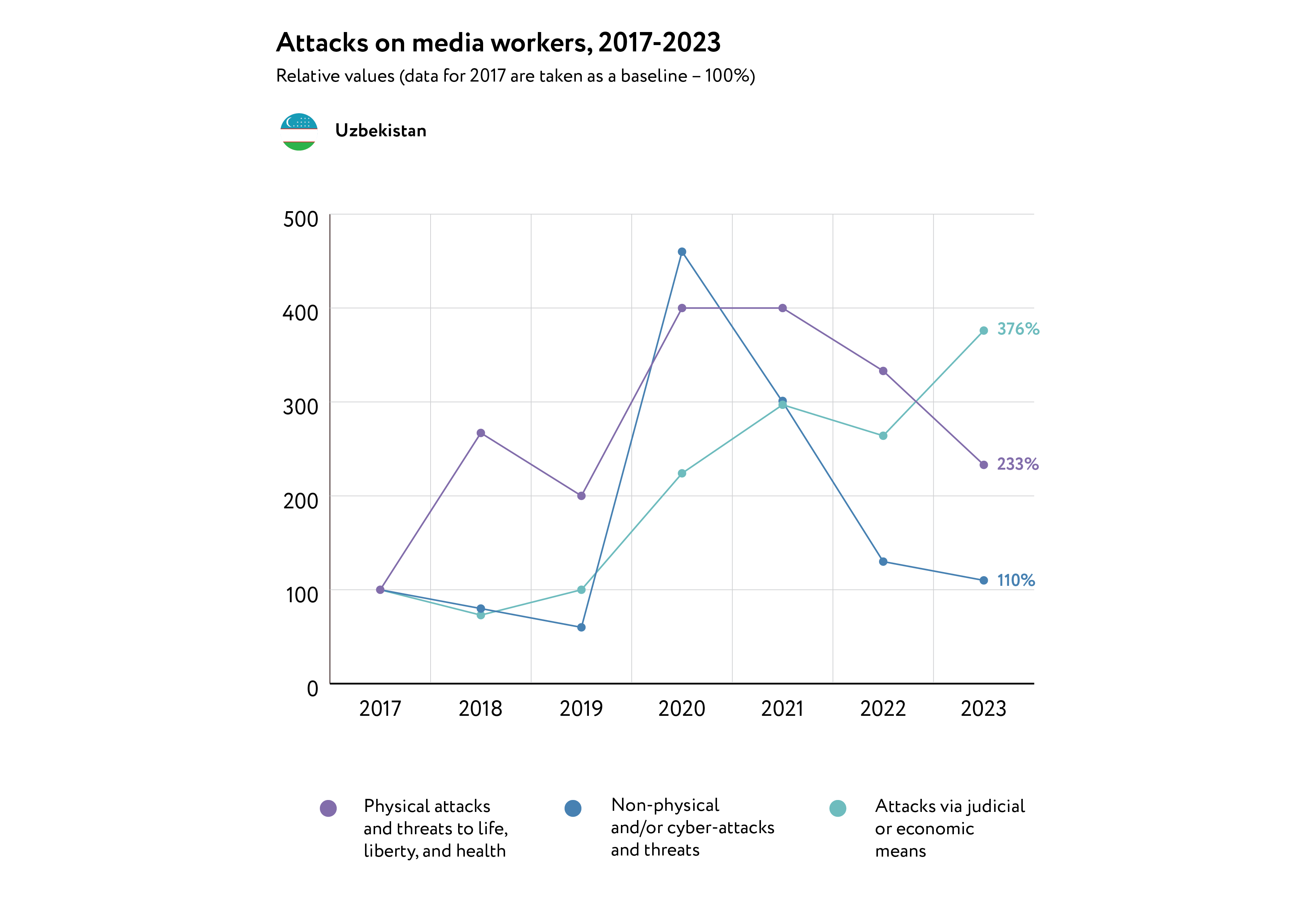
In 92% of cases, these attacks were committed by government officials. The total number of incidents was recorded by news outlets and information services available and accessible to the public. The monitoring of these attacks has revealed that media leaders and journalists/bloggers often remain silent about the attacks, fearing negative reactions from special services and government authorities. Often, information about attacks on media workers is disseminated through social media. This has become a consistent trend in recent years.
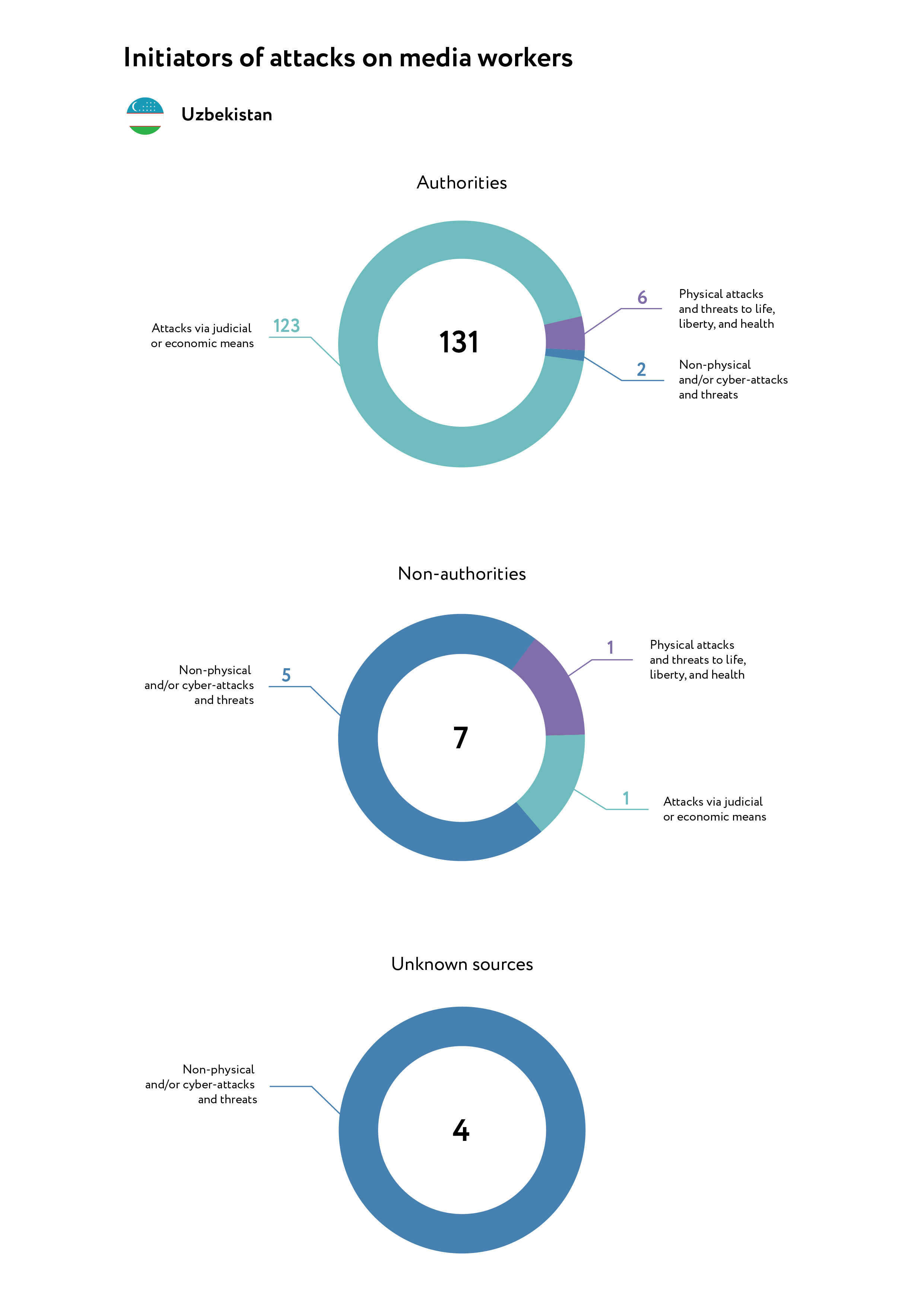
4/ PHYSICAL ATTACKS AND THREATS TO LIFE, LIBERTY AND HEALTH
In 2023, 7 incidents involving the use of physical pressure against media workers were recorded. All attacks, except one, came from government officials.
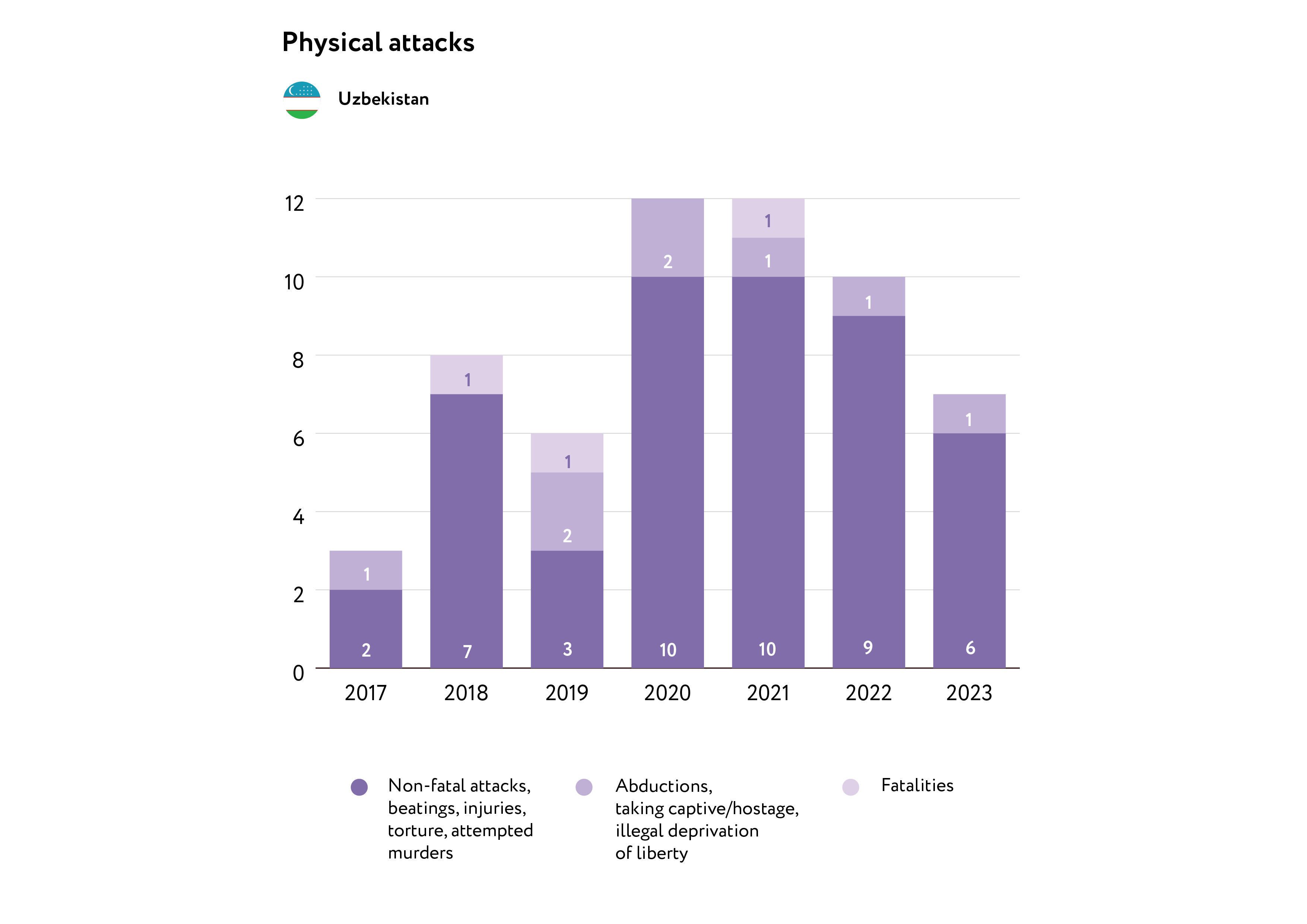
One incident related to abduction, kidnapping and wrongful imprisonment was recorded:
- On the evening of 19 May, blogger Miraziz Bazarov was detained in Tashkent and taken to the police department. According to Bazarov’s mother and other eyewitnesses, it appeared to be a kidnapping: men in civilian clothes “forced Bazarov into a grey car without any licence plates.” One eyewitness added: “He jumped out of the car and began to run away, shouting ‘help’, but several men from the car caught up with him and took him back by force.” Miraziz Bazarov’s lawyer filed a complaint complaint stating that, on 19 May 2023, law enforcement officers illegally detained Bazarov using force, and held him at the police department for more than eight hours. In January 2022, a court in Tashkent sentenced blogger Miraziz Bazarov to 3 years in prison on charges of libel.
Other incidents involving non-fatal attacks include:
- On 8 February, the mother of blogger Abdukodir Muminov reported that torture had been used against her son during an investigation. More information was revealed after Sabokhat Abdullayeva met with her son on 15 August in Detention Centre No. 1 (“Tashprison”) in Tashkent. “They forced my son to crawl on the floor and continuously kicked him in the ribs. They even kicked him in the genitals with the soles of their shoes. As a result of torture, he lost consciousness many times, but he was brought back around and again subjected to severe torture,” Sabokhat Abdullayeva said. According to Abdullayeva, Abdukodir told her that he was forced under torture to sign a confession.
- On 6 April, lawyer Sergei Mayorov described how the former editor-in-chief of the newspaper El Khyzmetinde (In the Service of the People), Dauletmurat Tazhimuratov, who was sentenced to 16 years in prison, was being abused in custody. He reported that his client had faced physical and psychological pressure from thugs presumably hired by whoever wanted to silence him. The lawyer also mentioned beatings: On 6 April, Tazhimuratov was brought to the Supreme Court to familiarise himself with the case. When he tried to defend himself, the guards tied him down and beat him.
- On 27 May, in the Yakkabag district of the Kashkadarya region, blogger Elmurod Odilov was detained for 15 days for hooliganism and obstruction of the official duties of a government official. According to the Department of Internal Affairs of the Kashkadarya region, Odilov arrived at a warehouse in the Ibn Sino micro-district of the Yakkabag district on 26 May at about 22:30 and “interfered with the work of farmers and insulted them”. Farmers filed a complaint against the blogger with the Yakkabag police department. On 27 May, the publication Daria reported that Odilov was “cruelly beaten” by police officers at the warehouse.
- On 9 October, blogger Abdukodir Muminov was sent to a punishment cell for 10 days while held in a pre-trial detention centre. He had been accused of “violating the internal rules of the correctional institution”. This was revealed after he turned to President Shavkat Mirziyoyev during an appeal court hearing and spoke about the torture to which he had been subjected. The prison administration stated that Abdukodir Muminov violated the rules of the pre-trial detention centre long before the appeal court meeting on 20 September, but had delayed the decision to send him to the punishment cell. The official reason for this was the blogger’s refusal to shave his beard, as well as insulting the pre-trial detention centre staff.
- On 28 October, blogger Sherzod Mamadaliev from Fergana was severely beaten, after which he spent five days in hospital with a broken jaw and an eye injury. A criminal case has been opened regarding this assault under Article 105 of the Criminal Code of Uzbekistan (“intentional moderate bodily injury”). Three suspects were detained. The blogger often posts humorous content on Instagram.
5/NON-PHYSICAL AND/OR CYBER-ATTACKS AND THREATS
It should be noted that the number of recorded non-physical attacks is decreasing each year. In 2021, 30 incidents were recorded; in 2022, 13; and in 2023, there were 11 attacks. However, the decrease in the number of recorded incidents is due to the editors of publications often preferring to not disclose threats against media workers. In turn, bloggers also often remain silent about the non-physical attacks they experience.
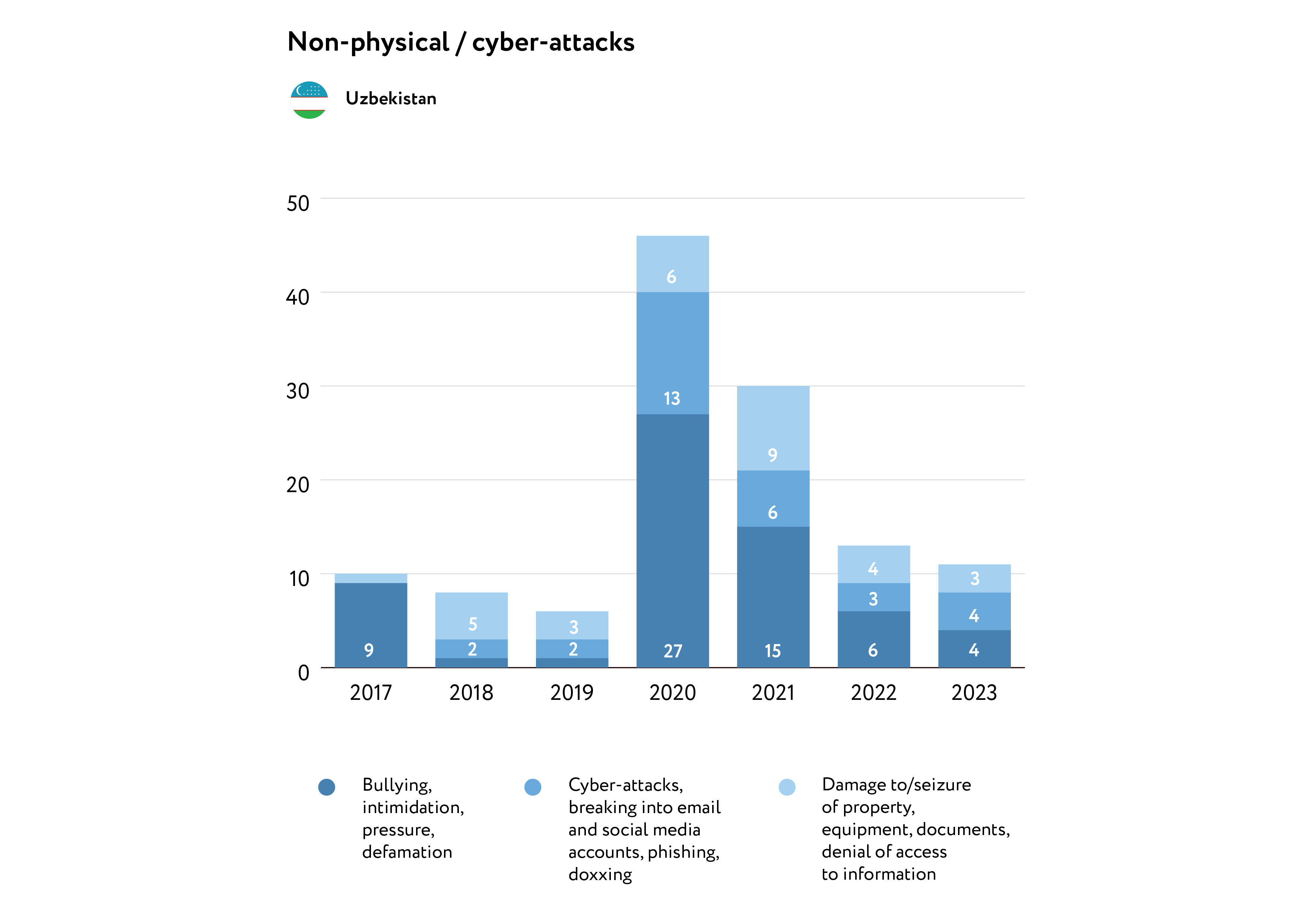
The main method of pressure, as in previous years, was bullying and spreading slanderous information about media workers:
- On 3 February, blogger and journalist Nikita Makarenko was threatened on social media by a representative of TOSHKENT O’RDASI LLC after the journalist defended an architectural monument in an online post. An individual using the name Azamat Abdullaev, who introduced himself as a general contractor, messaged Makarenko on Facebook and threatened to “find him” and “explain” why he is a traitor. There was also a campaign by controversial bloggers to discredit the journalist in July. Makarenko said: “In July, blogger Saodat Abduzakirova posted a very crudely photoshopped image on Facebook, where my head was placed on German politician Dirk Behrendt’s body; they claimed that I attended Berlin Pride.” Saodat did not delete her post even after she was accused of slander and spreading fake news, claiming that she took a screenshot of the original photo of the parade. Blogger Shukhrat Musaev threatened to “deal with” Makarenko in the same manner as blogger Miraziz Bazarov, who was severely assaulted in March 2021.
- On 8 February, after threats sent from unknown accounts, journalist and founder of the online publication Rost24.uz, Anora Sadykova, removed a video entitled “Epsilon – who is behind the company developing the underground wealth of Uzbekistan?” from the site. The journalist described how, after she published the video, the editorial office and those close to the editor-in-chief began to receive anonymous calls and demands that they remove the video. As a result, Rost24.uz was offline for five days.
- On 3 May, it was revealed that the head of the Nemolchi.uz project, journalist and activist Irina Matvienko, was forced to temporarily leave Uzbekistan due to death threats. An unknown person wrote to her, and threatened that there would be a reprisal against her and the website before the end of May. On 28 April, she filed a complaint with the Ministry of Internal Affairs regarding these threats. The department stated that these threats were being studied by the Cyber Security Centre of the Operational Investigation Department.
In 2023, 4 cyber-attacks and hacking attempts were recorded. Incidents include:
- On 6 January, unknown individuals attacked the Sarpa.media websiteafter it published an interview with the author of the satirical Telegram channel Ministry of Uzbekistan about fake news, clickbait, censorship, and problems with ministry communication. The outlet’s Instagram account was also hit by computer-generated attacks, with thousands of follower requests affecting the performance of the account and the ability to share content with authentic followers. “On 6 January 2023, our Instagram page was subject to a bot attack: in the space of 5 minutes, 10,000 people subscribed,” Sarpa reported. The online publication positions itself as a community for free-thinking people in Uzbekistan.
- On 25 June, the information and analytical website AsiaTerra was subjected to a DDoS attack. Administrators temporarily disabled the mobile version of the site, while the desktop version continued to work. The editors did not associate the attempt to hack the site with any particular analysis or report; the reason for the attack appeared to be the publication’s overall critical focus. There was another powerful DDoS attack on the site in spring 2022 after the publication of an article entitled “A provider of development and support for the Uzbek media is trying to deprive a journalist he dislikes of the right to his profession”. The site was down for approximately a week.
- On 30 October, unknown individuals tried to hack Roman Sayfutdinov’s Telegram channel Digitalism using an intercepted SMS code. Additionally, unknown individuals tried to hack the Telegram account of blogger and journalist Nikita Makarenko, also using an intercepted SMS code. The attacks apparently originated in France, via a VPN.
Other documented incidents include:
- On 3 February, following pressure from the Agency of Information and Mass Communications run by the presidential administration, an article entitled “State, maybe that’s enough?” written by the Gazeta.uz journalist Mukhrim Azamkhuzhaev, was removed from the site after being accessed by only 14 people. The article highlighted that, during winter 2023, the state was unable to provide the population with electricity or gas. The online media department of the Agency of Information and Mass Communications is responsible for monitoring the media, including blogs.
- On 31 March, Anhor.uz journalist Bobur Karimov reported that he had been illegally detained by security guards while leaving a market in Namangan. Having taken his camera, the police, with the assistance of nearby shop employees, deleted footage of smuggled tobacco products being sold.
- On 6 July, government officials prevented journalists from the independent publication Hook.report from observing the presidential election on 9 July. The official reason for their refusal is unknown, but this was most likely due to journalists’ activity during the April constitutional referendum, during which violations at polling stations were made public.
6/ ATTACKS VIA JUDICIAL AND/OR ECONOMIC MEANS
As in previous years, attacks via judicial and/or economic means were the most common method of exerting pressure on media workers in Uzbekistan. Specifically, the most common method of pressure was the initiation of criminal and administrative cases. Since 2022, the number of such attacks has doubled.
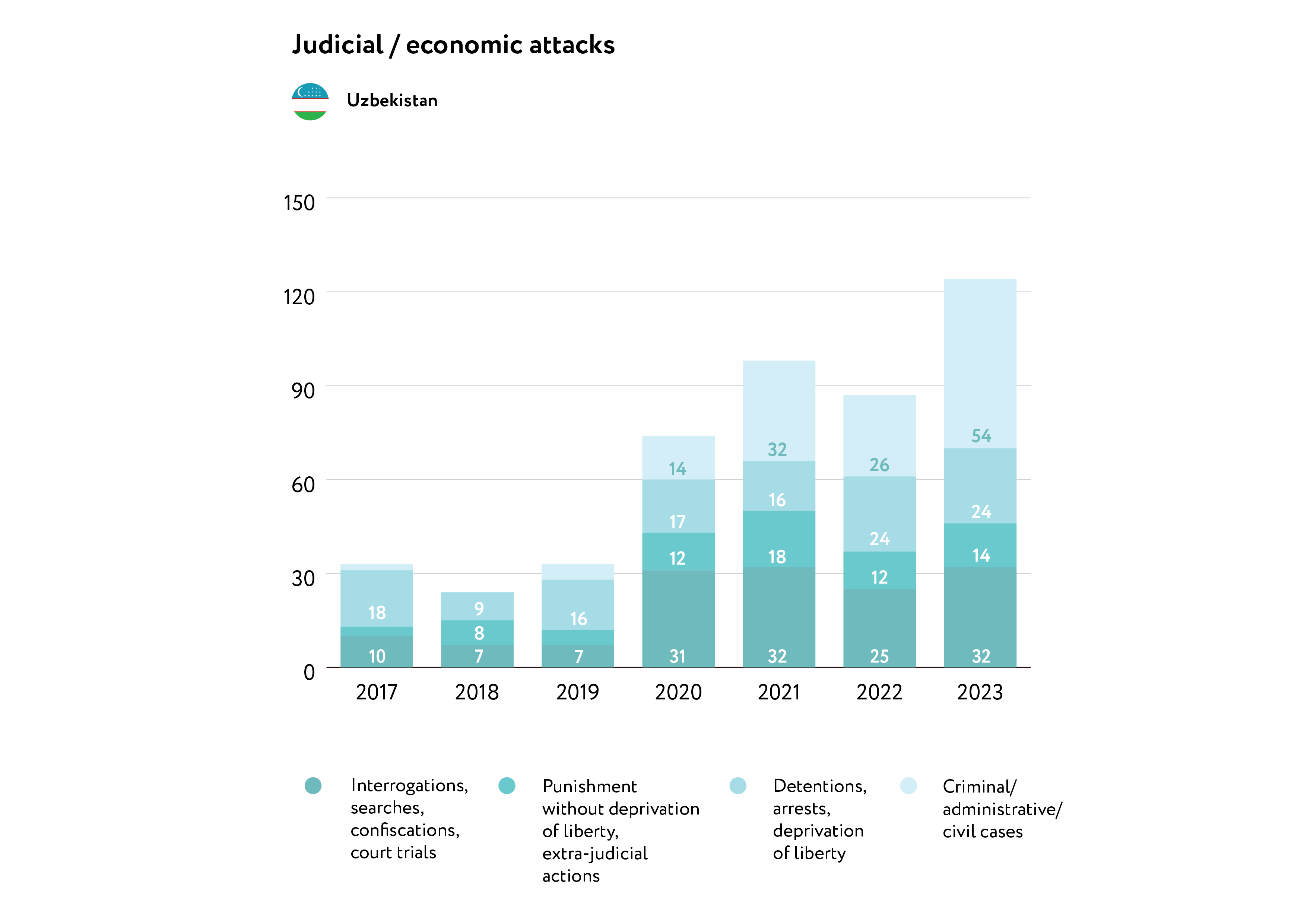
Of particular note is the use of punitive psychiatry:
- On 8 February, the criminal court of the Mirabad district of Tashkent declared 60-year-old Shokhida Salomova, author and administrator of the Telegram channel Pathanatomy of the Country of Uz and the YouTube channel Shakhina Salomova, which has more than 6,000 subscribers, to be insane and sent her for compulsory treatment. Salomova was arrested on 18 December 2022 after she posted several videos accusing President Mirziyoyev and his family of corruption and nepotism.
Legal proceedings against media workers affiliated with the Telegram channel Kompromatuzb and the online publication Human.uz were not transparent. In addition, many questions were raised about the harsh sentences given to journalists and bloggers from Karakalpakstan. In 2023, long prison terms and restrictions on freedom were imposed on the following individuals:
- On 4 August, blogger Abdukodir Muminov (who runs the YouTube channel Ko’zgu (Mirror)), considered an outspoken critic of Shavkat Mirziyoyev, was sentenced to 7 years and 3 months in prison. The criminal court of the Mirabad district of Tashkent also banned him from engaging in journalistic activities for 3 years. The court found him guilty under the following articles: Paragraph “a”, part 2 of Article 141-1 (“Violation of privacy resulting in serious consequences”); Paragraph “a” of part 2 of Article 165 (“Extortion on an especially large scale”); Paragraph “a” of part 4 of Article 168 (“Fraud on a large scale”); part 1 of Article 189 (“Violation of trading rules for goods or services of an especially large scale”); and Article 211 through Article 28 (“Complicity in bribery”) of the Criminal Code. On 7 October, the Court of Appeal of the Tashkent City Criminal Court upheld the sentence.
- On 25 August, the Khankinsky District Criminal Court of the Khorezm region sentenced blogger Shabnam (Nafosat) Ollashukurova to 3 years of restricted freedom on two counts. She was prohibited from leaving the Khorezm region and forbidden from using the internet. As noted in the court decision, she was detained on 14 March 2023 in the Bagat district of the Khorezm region and has been under house arrest since 16 March. She was charged under part 2 of Article 139 (“Defamation in print or in any other reproduced form, including information posted in the media or online”); “a” of part 3 of Article 139 (“Defamation combined with an accusation of committing a serious or especially serious crime”), and “a” of part 3 of Article 140 (“Insults in connection with the victim’s performance of their official or civil duty”) of the Criminal Code of Uzbekistan. In January, she posted a video on her YouTube channel about possible sexual, physical and psychological abuse of a 6-year-old girl. On 15 March, blogger Nafosat Ollashukurova and her two young daughters were taken to the Jizzakh regional police department for interrogation. On the same day, officers searched her apartment in Tashkent. Ollashukurova was detained based on a complaint regarding the coverage of the issue on social media. In recent weeks, Olloshukurova had been campaigning for the release of detained blogger Abdukadir Muminov.
- On 26 September, the Shaykhantakhur District Criminal Court of Tashkent issued a verdict in the case of the Kompromatuzb Telegram channel. Khurshid Daliev was found not guilty on some counts, under part 2 of Article 139 (“Defamation”) and paragraph “a” of part 3 of Article 165 (“Extortion on a large scale”) of the Criminal Code, and was acquitted. At the same time, he was found guilty under part 2 of Article 139 and paragraph “a” of part 3 of Article 165, as well as part 3 of Article 184 (“Evasion of taxes or fees on a large scale”) and Article 243 (“Legalisation of proceeds from crime”). He was fined 99 million som (around 8,000 USD) and sentenced to 7 years in prison. He was banned from working in the media, journalism or blogging for 3 years.
- On 12 October, the Zangiata District Criminal Court found blogger Lemara Mirzakhmedova (also known as Emine Karamanova) guilty under paragraphs “a” and “g” of part 3 of Article 139 (“Libel combined with an accusation of committing a serious or especially serious crime”), part 2 of Article 140 (“Defamation in print or in any other reproduced form, including information posted in the media or online”), and section “a” of part 3 of Article 165 (“Extortion on an especially large scale”) of the Criminal Code, and sentenced her to 7 years and 6 months in prison. In March, she was detained on questionable grounds and faced unverifiable accusations of theft and forgery of documents. Karamanova often criticised local officials, shed light on a range of social problems, and worked with citizens on a range of initiatives. The Tashkent Regional Criminal Court upheld the verdict.
- On 1 December, the Fergana District Criminal Court sentenced blogger Olimjon Khaidarov to 8 years in prison. The court found him guilty under part 2 of Article 139 (“Defamation in print or in any other reproduced form, including information posted in the media or online”), paragraph “a” of part 3 of Article 139 (“Defamation combined with an accusation of committing a serious or especially serious crime”), paragraph “a”, part 3 of Article 140 (“Insult in connection with the victim’s performance of their official or civil duty”), and paragraph “b”, part 2 of Article 165 (“Extortion on a large scale”). The court also ordered the blocking of the blogger’s channels, pages, and groups on social media. The defence is certain that the investigation and trial against Olimjon Khaidarov are related to his professional activities. Khaidarov was arrested on 29 July and taken into custody on the same day following a court decision. On the day of the arrest, police officers searched the blogger’s house, and seized two computers, a souvenir knife and old phones. On 28 December, the Fergana Regional Court considered Olimjon Khaidarov’s appeal against the 1 December verdict and upheld the verdict without any changes.
- On 5 December, following a protest from the prosecutor, the Andijan Regional Criminal Court toughened the punishment for blogger and human rights activist Otabek Akhliddinov. The court overturned the previous decision and sentenced him to 7 years’ imprisonment and 1 year of restricted liberty, including limits on future employment positions and a ban on blogging for a period of 3 years. In November, the court sentenced him to 5 years and 1 month in prison. The defendant’s lawyer reported that the court did not consider his arguments and did not evaluate the testimony of witnesses or material evidence. Otabek Akhliddinov has six children, and is a member of the human rights organisation Ezgulik.
On 31 January, at a trial in Bukhara, sentences were passed on participants in last year’s protest events in Karakalpakstan. Protests in the capital of Karakalpakstan, Nukus, began on 1 July 2022, with objections against draft amendments to the Constitution, including a proposal to exclude provisions on the sovereignty of Karakalpakstan and the right of its people to secede based on the results of a general referendum.
- Blogger and founder of Ayama.uz, Bakhtiyar Kadirbergenov, was found guilty under part 3 of Article 244 (“Organising mass riots accompanied by personal violence, pogroms, arson, damage or destruction of property, resistance to a government official using or threatening to use weapons or other objects, as well as active participation in mass riots”) and paragraph “d” of part 3 of Article 277 (“hooliganism associated with resistance to a representative of the government or the public performing duties to protect public order, or to other citizens suppressing hooligan behaviour”) of the Criminal Code, and was sentenced to 7 years in prison.
- Blogger Azamat Nuratdinov from the Muynak district of Karakalpakstan was found guilty under part 3 of Article 244 and paragraph “a” of part 3 of Article 244−1 of the Criminal Code, and was sentenced to 5 years of restricted freedom. This was reduced to 4 years, 5 months and 17 days to account for time served. The blogger was released from custody in the courtroom.
- The founder of the Makan.uz website, Lolagul Kallykhanova, was given an 8-year suspended sentence with a probationary period of 3 years. Kallykhanova’s sentence was reduced to 7 years, 5 months, and 6 days to account for time served. After the verdict was announced, she was released from custody. Kallykhanova was found guilty under part 4 of Article 159 (“Conspiracy to seize power or overthrow the constitutional order of the Republic of Uzbekistan”), as well as two articles of the Criminal Code.
- The former editor-in-chief of the newspaper El Khyzmetinde (In the Service of the People), Dauletmurat Tazhimuratov, was sentenced to 16 years in prison. Tazhimuratovis required to spend the first 2 years of his sentence in prison, and the rest of the term in a maximum security colony. He was found guilty under part 4 of Article 159 (“Conspiracy to seize power or overthrow the constitutional order of the Republic of Uzbekistan”), as well as four other articles: paragraph “a” of part 3 of Article 167 (“Theft by embezzlement or embezzlement on a large scale “), Article 243 (“Legalisation of proceeds from crime”), part 3 of Article 244 (“Organisation of mass riots”) and paragraphs “a, b, d” of Article 244−1 (“Manufacture, storage, distribution or display of materials containing a threat to public safety and public order, by prior conspiracy or by a group of persons, using the media or telecommunications networks, as well as the internet”). In addition, Tazhimuratov was fined 228.8 million som (around 18,000 USD).
In addition, on 17 March 2023, courts announced verdicts against 39 defendants in the second trial about events in Nukus in July 2022. 28 people received prison sentences ranging from 5 years to 11 years, and 11 others were sentenced to 5 years of restricted freedom. Journalists were among those convicted:
- Ishonch newspaper journalist Yesimkan Kanaatov was sentenced to 5 years of restricted freedom. He was found guilty under part 3 of Article 244 (“Organising mass riots accompanied by personal violence, pogroms, arson, damage or destruction of property”) and paragraphs “a” and “d” of part 3 of Article 244−1 of the Criminal Code (“Manufacture, storage, distribution or display of materials containing a threat to public safety and public order, by prior conspiracy or by a group of persons, using the media or telecommunications networks, as well as the internet”). The court also ordered Kanatov, as one of the 39 defendants, to jointly compensate for the material damage, with a fine of over 6.5 billion som (around 500,000 USD).
- · The editor-in-chief of the newspaper El Khyzmetinde, Abdimalik Khozhanazarov, was sentenced to 5 years of restricted freedom and released from custody in the courtroom. He was found guilty under part 3 of Article 244 (“Organising mass riots accompanied by violence against the individual”) and paragraphs “a” and “d” of part 3 of Article 244−1 of the Criminal Code (“Manufacture, storage, distribution or display of materials containing a threat to public safety and public order, by prior conspiracy or by a group of persons, using the media or telecommunications networks, as well as the internet”). The court also ordered Khozhanazarov, as one of the 39 defendants, to jointly compensate for the material damage with a fine of over 6.5 billion som (around 500,000 USD).
In 2023, the practice of banning “undesirable” journalists from entering the country continued:
- On 3 April, independent journalist and documentary film producer Shahida Yakub (Tulaganova), who had flown from London to Tashkent, was not allowed into Uzbekistan. Shahida is a native of Uzbekistan and holds British citizenship. She said she was not given any reason for the refusal. They told her that her children were allowed in without her, which she refused. Shahida believes that this is related to her journalistic activities. The Uzbek authorities, she said, “could not forgive her” for her coverage of events in Andijan in May 2005.
- On 19 October, the Sweden-based Uzbek journalist and editor-in-chief of the independent publication Eltuz.com, Kudrat Babajanov, was forbidden from entering Turkey by border patrol in Istanbul. Border guards hinted to Kudrat that the entry ban was related to his journalistic activities. The 58-year-old journalist intended to meet relatives from Uzbekistan in Turkey.
One publication and several bloggers were forced to cease their journalistic activities after pressure from city authorities:
- On 5 June, the Kashkadarya publication Nasafnews.uz announced it was shutting down. The head of the publication and author of the blog Captain Karimov, Umid Karimov, also stated that he would no longer be maintaining his blog. Following this, bloggers Otabek Artikov and the author of AvtoblogUz, Maksud Muzaffarov, who also operated in the Kashkadarya region, reported that they had stopped their work. A few days earlier, 2 of these bloggers were detained in Shakhrisabz for 5 days for “petty hooliganism”, “failure to comply with the legal demands of police officers”, and other violations. This took place following a conflict with the leadership of the city’s internal affairs department.
ANNEX 1: OPEN SOURCES USED FOR GATHERING DATA (UZBEKISTAN)
- ACCA.media – an independent human rights media project that reports on human rights violations;
- Anhor.uz – a news website specialising in news about Uzbekistan;
- AsiaTerra – an information and analysis website covering Central Asia;
- Daryo.uz – a news website specialising in news about Uzbekistan;
- Gazeta.uz – a news website specialising in Central Asian news;
- Kun.uz – a news website specialising in news about Uzbekistan;
- Mediazona.Central Asia – an information and analysis website covering Central Asia;
- Radio Ozodlik – the Uzbek Service of Radio Free Europe / Radio Liberty;
- Open-source media in Uzbek, Russian, and English; accessible on the internet and social media.
